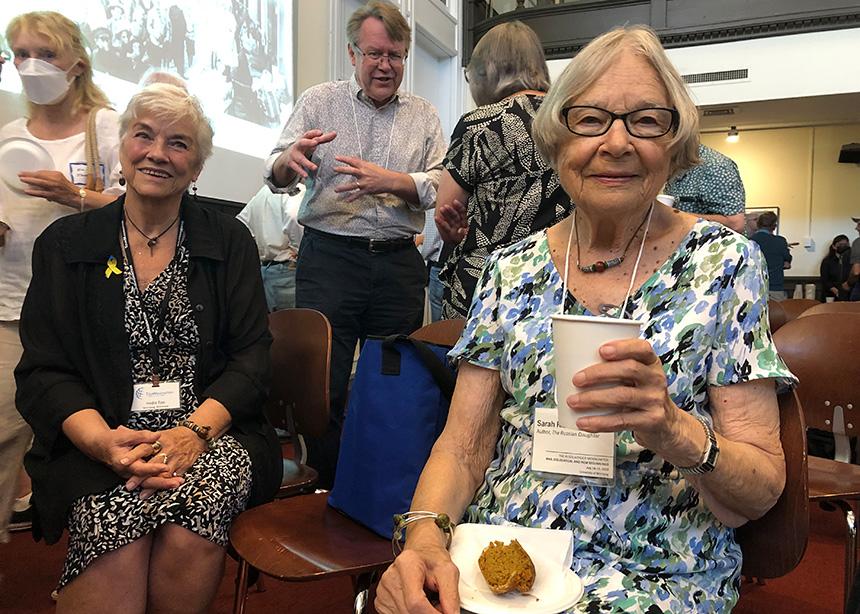
Author Sarah Klassen (right). (Photo by John Longhurst)
“I think of my novel as a migration narrative.”
That’s what author Sarah Klassen said about her new book, The Russian Daughter, at “The Russlaender Mennonites: War, Dislocation, And New Beginnings,” a July 14-15 conference at the University of Winnipeg.
Klassen, the award-winning author of 12 books, was interviewed by Canadian Mennonite University English professor Sue Sorensen.
“There’s a connection between my novel and the anniversary,” she said, noting how the main characters “have to face a question our ancestors faced in 1920s: To leave or to stay?”
By leaving, they left behind “a country most of them loved very much,” Klassen said. “It was not an easy decision.”
Thinking about the migration, there are “many stories of rifts in families as some stayed, some left, siblings and parents were divided,” she said. “My characters have to face that decision.”
And the same kinds of decisions are still being made by people today, Klassen noted. “We still have refugees coming from that area, this time not by train, though.”
The book itself owes its creation to stories told by her mother, Klassen said.
“I am greatly indebted to her as a storyteller,” she said. “She wanted to share those stories and I was her audience.”
As a child, Klassen admitted to not being particularly interested in the stories. “But I eventually got smarter and realized these stories are my heritage,” she said.
One of those stories, which her mother shared only once, was about a childless Mennonite couple in the Soviet Union who wanted to adopt a child.
“I remember she told it to me on a dark winter night,” Klassen said. “It was about a couple in a Mennonite village who were prosperous farmers, but had no children. The woman desperately wanted children. They adopted two girls. Both adoptions ended badly.”
She thought it would be easy to write the book, but it turned out to be hard. “When I started writing, things changed,” she said. “I couldn’t maintain the story the way I had expected.”
The story itself is fiction, as is the village and people in it, Klassen said.
“I made no effort to locate the village in a specific place anyone could identify,” she said, noting that was “partly as protection for myself” in case she got distances and locations wrong.
But that hasn’t stopped some readers from trying to identify where it is, or who it is about. “I’ve had to contend with some readers who complain about accuracy,” she said.
Klassen credited people like Gerhard Lohrenz, who was her teacher at Mennonite Brethren Collegiate Institute (MBCI) in Winnipeg—“a knowledge keeper among our people,” she said—along with authors like Sarah Birdsell, Rudy Wiebe, Peter Epp who inspired her as an author.
When asked why she thought there was so much Mennonite writing today, Klassen suggested it might be because “Mennonites have reached a stage of prosperity, time to pay attention to arts and literature.”
Plus, she added, “we have many stories to tell.”
Of her novels, Klassen said “I don’t consider myself a historical fiction writer,” saying she has been surprised to be thought of that way.
In her mind, historical fiction should have a major historical figure in it, along with major historical events. She writes about “ordinary people,” she said.
Sponsored by the Centre for Transnational Mennonite Studies at the University of Winnipeg, the conference was part of Memories of Migration: Russlaender 100 Tour.
Topics included in the conference were Neighbours, Revolution, and Civil War; Exodus and Accommodation; The Soviet Promise; Immigration, Deportation, and Encounters; and An Immigrant Culture.
About 200 people attended the conference in person, with about 150 joining online.
John Longhurst is a Winnipeg freelance writer who is blogging about the tour.
